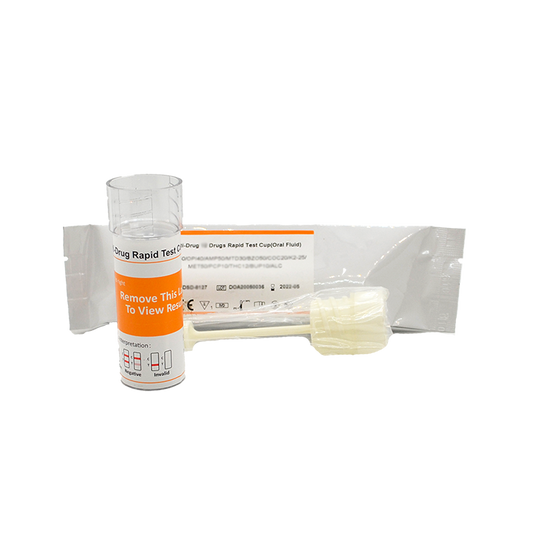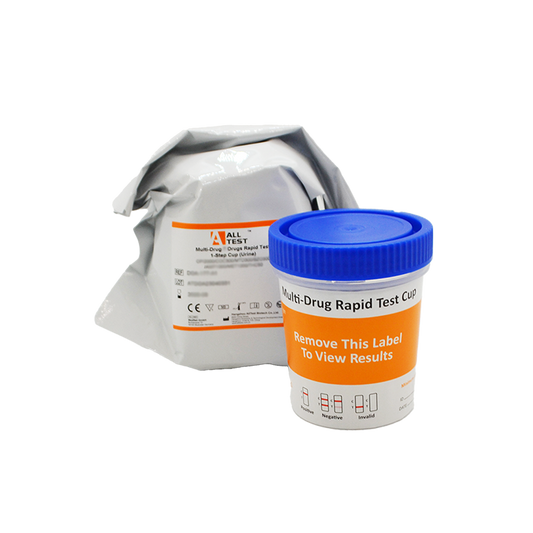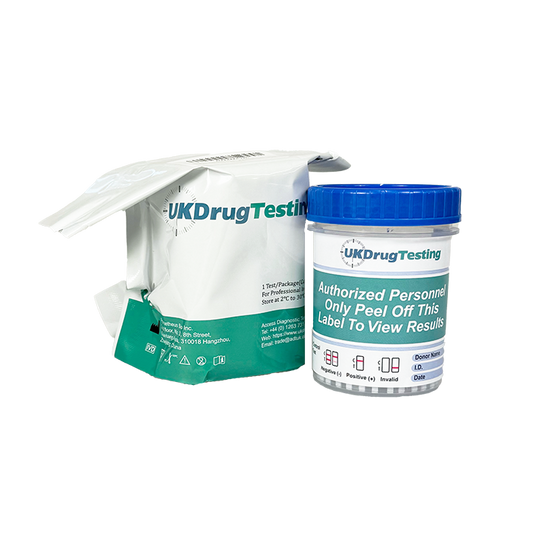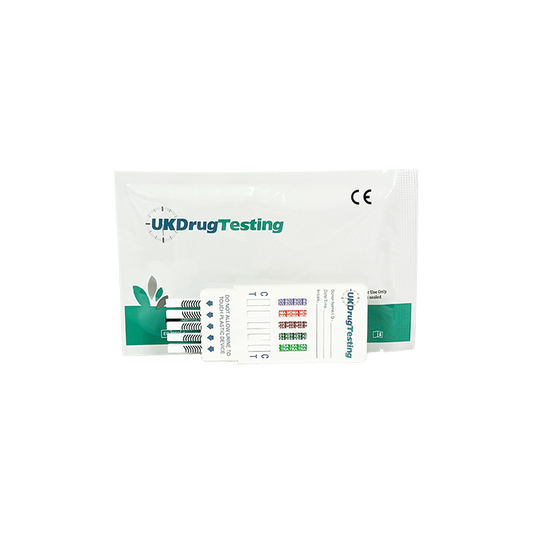Drug use in UK schools
In the UK, schools have a responsibility to ensure the safety and well-being of their students. One way some schools approach this is by conducting drug tests. However, the legality and method of these school drug tests vary. Under certain circumstances, schools may conduct drug tests if they believe it is necessary for maintaining discipline or ensuring safety. Let's break down the different types of drug tests that schools could potentially use.
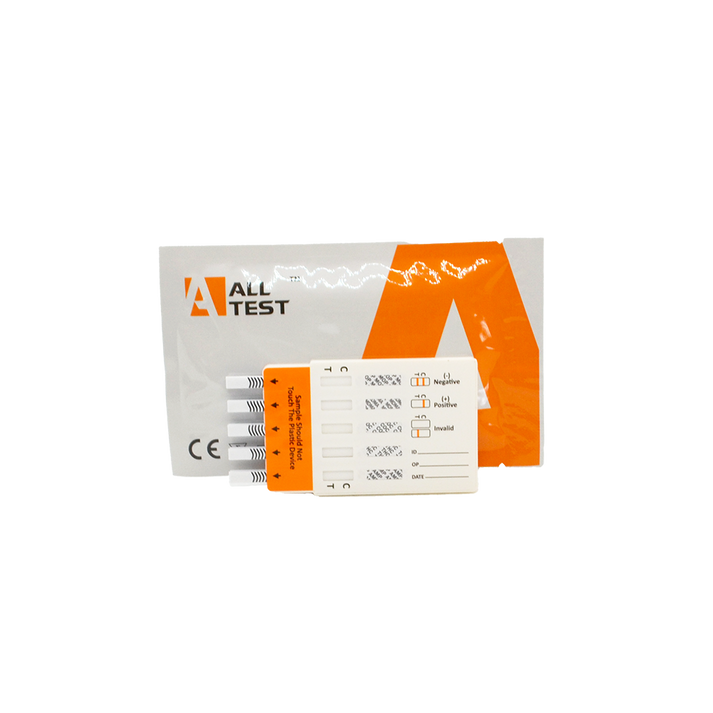
Urine Drug Test Multi Panel (Party)
From £2.80 GBP
Ideal schools drug test for students and university students.
Can Schools Perform Urine Drug Tests?
Yes, urine drug tests are one of the most common methods of detecting drugs in a person's system. In the UK, schools are legally allowed to conduct urine drug tests if they have a valid reason and have received the student’s and their parent’s consent. Typically, these tests are used in cases where there is a suspicion of drug misuse. While schools may perform urine tests, it is essential that these tests are carried out in a way that respects the student's privacy and dignity.
Can Schools Perform Saliva Drug Tests?
Yes, saliva drug tests are another option that some schools may consider. These tests are less invasive than urine tests and are typically used to detect recent drug use, as saliva can capture substances taken within the last few hours. While saliva tests are easier to administer, they are less commonly used in schools compared to urine tests. Just like with urine tests, consent from the student and their parent is required.
Can Schools Perform Blood Drug Tests?
No, blood drug tests are the most invasive form of drug testing and are rarely, if ever, conducted in a school setting. Blood tests provide highly accurate results and can detect substances taken recently. However, due to their extremely invasive nature and the need for medical professionals to administer them, blood drug tests are not performed in schools in the UK.
What is the Most Accurate Drug Test A School Can Perform?
In practice, schools are more likely to use urine drug tests, as they offer a good balance of accuracy and ease of administration. Blood tests are the most accurate method for detecting drugs, as they can measure both the type of drug and the concentration in a person's system. However, they are unlikely to be performed in schools due to the complexity and invasiveness of the procedure.
Consequences Of Failing A Drug Test In Secondary School
Failing a drug test in a secondary school can have serious consequences for students. Depending on the school's policies, the student may face disciplinary action such as suspension or exclusion. In many cases, the school may also involve parents or guardians and refer the student to external support services, such as counselling or drug rehabilitation programs. Additionally, the incident may impact the student’s academic record and future opportunities, particularly if drug use is repeated or becomes a larger issue.
Consequences of Failing a Drug Test at College or Sixth Form
The consequences of failing a drug test in college or sixth form can be even more severe. Since students are older and considered more responsible for their actions, the institution may have stricter policies in place. In some cases, failing a drug test could lead to expulsion from the institution or affect a student’s eligibility to sit for exams. Furthermore, many colleges and sixth forms may involve external agencies or the police if illegal substances are found. The student’s future educational and career prospects could be at risk, especially if universities or employers are notified of the incident.
State Schools Vs Private (Public) Schools
Yes, penalties for taking drugs can vary between state schools and private schools in the UK, as each school can set its own disciplinary policies within the framework of UK law. Here's a breakdown of how these penalties might differ:
State Schools:
- Government Guidelines: State schools are required to follow national education guidelines, including those from the Department for Education (DfE). These schools typically have a zero-tolerance policy towards drugs and substances.
- Disciplinary Actions: State schools often follow a structured approach to discipline. For drug-related incidents, punishments could include suspension, expulsion, or a referral to external services like substance misuse agencies, the police or local authorities.
- Support Programs: Many state schools also have access to government-funded support programs to help students dealing with substance abuse.
Private Schools:
- Autonomy: Private schools have more flexibility in setting their own rules and policies, which can lead to varying penalties for drug use.
- Stricter Policies: Some private schools may enforce stricter punishments, including immediate expulsion, depending on the severity of the situation and the school's ethos.
- Milder Policies: On the other hand, some private schools may opt for more flexible or moderated disciplinary actions. Factors such as the financial and reputational implications of losing a student may lead to punishments that focus on rehabilitation or supportive measures while still maintaining the student's place at the school.
- Rehabilitation Focus: On the other hand, some private schools may take a more rehabilitative approach, offering counseling and support before resorting to expulsion.
- Parental Contracts: Many private schools have contracts with parents outlining expected behavior and consequences, which might include clear penalties for drug use.
In both types of schools, serious drug incidents can involve police intervention, and the consequences often depend on the severity of the case and the school’s particular policy.
Can Schools Perform Drug Tests in the UK without Parental Permission?
In the UK, schools generally cannot perform drug tests on students without parental permission, especially for students under the age of 16. Consent from either the parent or guardian is typically required before any drug testing can be carried out. Schools must have a clear reason for testing, such as concerns about safety or the well-being of the student or others, and even then, the testing should be done with appropriate safeguards to protect the student’s privacy and dignity.
For students aged 16 and over, they are considered capable of providing consent for themselves in most cases. However, schools often still seek parental involvement, particularly if the student is under 18, as parents or guardians are still responsible for their welfare.
In cases where there are significant concerns about drug use, schools may take alternative actions, such as involving external agencies, rather than conducting drug tests without permission.
Can a Parent Refuse a Drug Test for their Child?
In the UK, if a student or their parents refuse to consent to a drug test, schools generally cannot force the test or take direct action solely based on the refusal. However, the school may take other steps depending on the circumstances surrounding the refusal and the school's policies.
If a school has reasonable grounds to suspect that a student is under the influence of drugs (for example, based on behaviour, appearance, or reports), they may still be able to take disciplinary action even without a drug test. This could include measures such as:
- Suspension or exclusion if the student's behaviour poses a risk to themselves or others.
- Referrals to external agencies, such as social services or drug counselling services, if the refusal raises concerns about the student's well-being.
- Involving parents or guardians in discussions around support or intervention programs, even if a drug test isn't performed.
Ultimately, the refusal to participate in a drug test doesn't automatically mean the student will face punishment. Still, schools may use the broader context of the situation to decide if any action is necessary. Schools are expected to handle these situations carefully, respecting students' rights while ensuring a safe environment for all pupils.
Consequences for Parents if Their Child is Found Under the Influence of Drugs
If a student is found to be under the influence of drugs in school, the consequences may extend beyond the child, potentially impacting the parents or guardians as well. Schools are likely to notify the parents immediately and may expect their involvement in addressing the situation. In cases where the child’s drug use is linked to parental neglect or lack of supervision, social services could become involved, potentially leading to investigations into the home environment. This could result in the involvement of child protection agencies to ensure the child’s welfare is safeguarded.
Furthermore, parents could face legal repercussions depending on the circumstances. If it is found that the drugs were obtained at home or due to a parent’s negligence, the authorities could pursue legal action against the parents. This could range from fines to more serious charges if it is proven that the parent contributed to or enabled the drug use. In some cases, particularly if illegal substances are found on the premises, parents may also be at risk of criminal charges, which could have significant legal and financial implications.
Beyond legal consequences, parents may also face social and emotional ramifications. The discovery of a child’s drug use can strain relationships within the family, and parents may find themselves judged by other parents or members of the community. Schools may also require parents to attend meetings with counsellors or external agencies to create a support plan for the child, adding further stress to an already difficult situation.
For more guidance on drug testing in schools visit UK Drug Testing
See the UK Drug Testing 10 panel schools combination urine drug test kit


